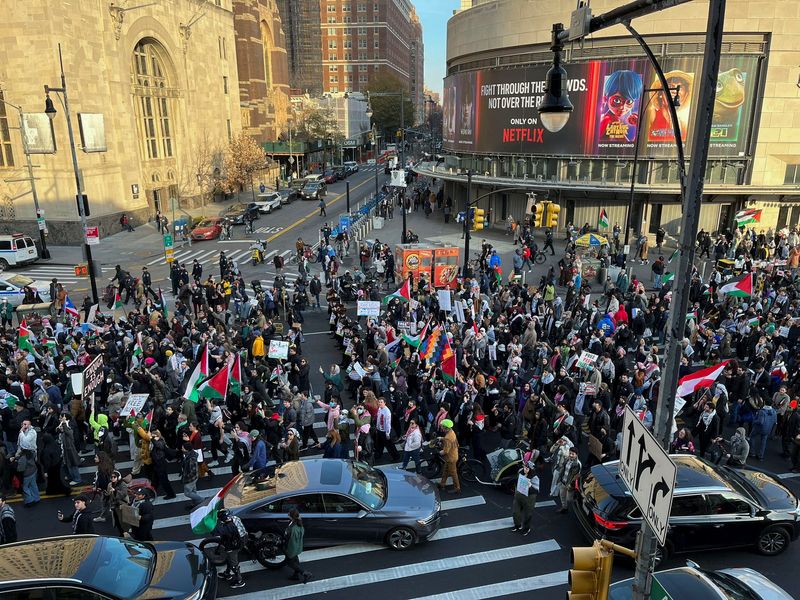How Arizona college class on Gaza led to doxxing, retaliation
2023.12.14 15:53

© Reuters. People march down Flatbush Avenue in the New York City borough of Brooklyn, during a pro-Palestinian demonstration, amid the ongoing conflict between Israel and Palestinian Islamist group Hamas, in New York, U.S., December 9, 2023. REUTERS/Jonathan Oatis/
(In paragraph 13, corrects date of broadcast from Wednesday to Nov. 13)
By Andrew Hay
(Reuters) -A University of Arizona assistant education professor and her colleague have led weekly class discussions they hope will help aspiring teachers one day handle difficult conversations in the classroom.
When the topic in November was Hamas’ attack on Israel and Israel’s retaliation in Gaza, the discussion led to complaints from students, a viral posting of a student recording of the class and a brief university-ordered leave for the educators.
It was a lesson in how hard it is to address divisive issues in the United States, where protests and charged debates have erupted on campuses across the country since the Oct. 7 Hamas attack. Leaders of prominent universities have been called to Washington to testify about the tension between protecting academic freedom and free speech and ensuring safety and nondiscrimination.
In Arizona, the Gaza violence came up in the fall term of a class called Cultural Pluralism for Young Children led by Assistant Professor Rebecca Lopez and Community Liaison Rebecca Zapien for the university’s college of education.
Lopez told Reuters this week that she approached the issue, as she did other socio-political topics for the class, from the standpoint of “oppression.”
“We’re focusing on Palestinian life because those are the ones that are not being talked about or privileged,” Lopez said. “They’re the group of people being oppressed at a higher level.”
Lopez said complaints from students who felt this represented bias against Israel went to the university’s office of institutional equity which ruled discrimination had not taken place.
Then clips of a student’s audio recording of the class discussion were posted by the Israel War Room, a pro-Israel group, on social media platform X. The same day, Arizona state legislator Alma Hernandez, a pro-Israel Democrat, posted on X that Lopez and Zapien were teaching that antisemitism “isn’t real” and demanded the university “investigate and do the right thing.”
In the recording, Zapien said Hamas appeared to be anti-Zionist rather than antisemitic, and Lopez said Hamas was a resistance group in some ways comparable to the African American revolutionary Black Panther Party. Hamas appears on the U.S. government’s list of “foreign terrorist organizations.”
The university said in a statement on Nov. 13, a day after the Israel War Room and Hernandez postings, that it had replaced Lopez and Zapien in the classroom and was investigating. The two were allowed to return to work but not to the classroom on Dec. 1.
“We reaffirm our commitment to an academic instructional setting that respects all viewpoints,” College of Education Dean Robert Berry said in a Dec. 1 statement. He added that the department head would teach Lopez’ and Zapien’s class for the rest of the semester and the college would provide workshops on teaching potentially contentious topics.
The university said in a statement on Wednesday that administrative leave with pay is not a disciplinary action but offers an opportunity to obtain and evaluate facts and let the situation cool down.
Rabbi Shmulie Sanowicz of the university chapter of Chabad, a Jewish organization serving college campuses, said Jewish and non-Jewish students made bias complaints and faced retaliation from professors and other students.
STUDENTS SPEAK OUT
Some students called for the instructors to be fired.
“I don’t want them on my campus,” Rachel Garfield, who said the teachers denied Hamas was a “terrorist” group, told local TV station KVOA in comments broadcast on Nov. 13.
Garfield did not respond to a request for comment.
A student who asked not to be named told Reuters the educators “preach anti-bias education” but showed “hypocrisy,” by condemning anyone who supported Israel.
Zapien said she stood by their model for the class conversations, which have dealt with issues ranging from immigration to school underfunding, from viewpoints that are “not part of the dominant discourse and culture.”
“The ideas of looking at genocide, it doesn’t diminish the existence and survival of people who are Jewish,” Zapien said. “It’s the idea that we all get to have the same dignity and ability to exist.”
The instructors received support from other students.
“I have learned more about being an inclusive teacher and understanding my own biases from these professors than I have from anyone else,” according to an anonymous Instagram post that said it was by a Jewish student in support of the teachers.
Websites have called the instructors “terrorist lovers” and “terrorist sympathizers,” disclosed their phone numbers and given instructions on how to find their addresses, Lopez said, making them fearful.
“I have two kids and I’m worried about them at school,” she said.








